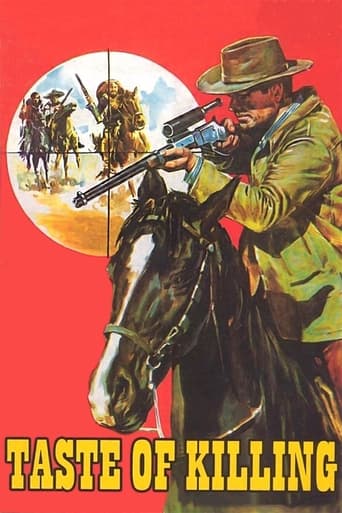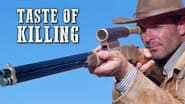Red-Barracuda
This above average spaghetti western focuses on a bounty hunter who is hired by bankers in a small town to protect their cachet of gold against a predicted heist by Mexican bandits.The director here was Tonino Valerii who was assistant director to Sergio Leone in his first two classic westerns, A Fistful of Dollars (1964) and For A Few Dollars More (1965). He then went it alone himself as a director making very good efforts such as Day of Anger (1967), A Taste of Killing was his debut as director and while it isn't quite as good, it is still definitely an impressive effort and better than most in its sub-genre. It benefits from a good turn from Craig Hill in the central role as the bounty hunter. He has unusual vulnerabilities such as the fact he can't read but he also has the more typical spaghetti western trait in that he is in possession of an unusual weapon, in this case a sniper rifle with telescopic sight. He is a nicely amoral central character who waits for robberies to happen and then proceeds to rob the robbers and return the money to the authorities and so bagging 10% in the process! The movie ends with a wry scene where our hero observes a gang of new bandits through his telescopic lens as they prepare to ambush the gold shipment he protected earlier on. He couldn't be happier - another 10% deal looks imminent.
Leofwine_draca
A TASTE OF KILLING is a low budget and generic spaghetti western made in the wake of the success of Sergio Leone's A FISTFUL OF DOLLARS. It stars the square-jawed Craig Hill as a supremely confident bounty hunter who makes a living from bumping off bank robbers until some money-men come up with a new mission for him: to stop a planned heist BEFORE it takes place.This movie is undistinguished by genre standards although there isn't really anything to dislike about it. Director Tonino Valerii would later go on to helm stylish efforts like MY NAME IS NOBODY and A REASON TO LIVE, A REASON TO DIE and it's clear he was finding his feet with this, his first movie. The familiar faces of Spanish star Fernando Sancho and George Martin (as the baddie) appear, and watch out for Chinese actor George Wang cast as a Mexican.The plot and characters are rather typical for this genre and there are few twists to keep you occupied. However, the cinematography at least makes it look good, and the various action scenes are well handled. What I particularly liked was the lead's proficiency with his sniper rifle, which leads him to take down various enemies at various points throughout the movie. It's a nice little addition to an otherwise uneven outing that's only suitable for die-hard genre fans.
Wizard-8
I'm glad that there is a DVD company (Wild East) in North America that is releasing a number of spaghetti westerns that never before got the attention in North America, probably due to the fact that they generally don't have the star power as other spaghetti westerns. I just watched one of their releases -"Taste Of Killing", and as a spaghetti western fan I was satisfied by the end for several reasons.One reason is that the hero of this spaghetti western is not a superhero. Yes, he's smart and quick with a gun, but he doesn't seem to have mystical powers like other spaghetti western heroes. He can't read, for one thing, and in a few instances he relies on teaming up with townspeople so that his plans can succeed. Craig Hill does well playing this hero.The script has a few other surprises as well. It's a more leisurely-paced movie, with not as much action as some other spaghetti westerns. (Though the action scenes are pretty good, especially the final shootout with the evil gang on the city streets.) But the script keeps up plenty of plot turns so viewers won't get bored. There's also plenty of focus on some of the supporting characters.And as a bonus, there's a tuneful and lively score by Nico Fidenco. In short, there's a lot to like here. Maybe this isn't a spaghetti western to start with if you are unfamiliar with the genre, but for fans of the genre it will satisfy.
rmahaney4
This was SW notable Tonino Valerii's first directorial effort in the genre. The year before he had served as 2nd Unit Director on Sergio Leone's For A Few Dollars More, and the influence of that experience are obvious on this film. Much of the film was shot on sets from FAFDM and there are number of scenes - Lanky's shoot out with Sanchez is a perfect example - that match similar scenes in the second Dollars film almost shot for shot. As in that film, we spend a lot of time watching action from a distance through the (anti)hero's telescope. This is interesting because most of Valerii's western follow the model of his 2nd SW, Day of Anger, and are firmly in the Duccio Tessari/Ernersto Gastaldi 'school', which was very different from the Leone westerns. Their visual and narrative style is distinct and is often described as being more "traditional". The characters in these films tend to a little less cynical, more immediately sympathetic, though the films tend to be a bit hokier. A perfect example would be Arizona Colt (1966).The film is uneven, though it would be largely enjoyable for genre fans. The story involves the usual SW elements - wolves in sheep's clothing, ambushes, bank raids, ritualized gunfights, taciturn gunmen, and loud Mexican bandits. Craig Hill does a credible turn as a Clint Eastwood stand-in, though it is his characterization of Hank 'Lanky' Fellows that is one the most confused elements in the film. He actually ends up being more cynical than the Man With No Name, while the villain, Gus Kennebeck, is by turns more vile than Indio from FAFDM (as he tortures his brother with boiling coffee), then alternately sympathetic (through his relationship with his son and the son's mother). His motivations are more immediate than Fellows's, who repeats several times throughout the film that 'You can never have too much money'.There was a very good film in here somewhere in the Gothic family western manner that was flourishing in 1966-1968 (Return of Ringo, Texas, Adios, The Forgotten Pistolero) with it nasty infighting and violence between the two Kennebeck brothers - the one who as gone straight and dresses like a gringo, the other has become a brutal bandit leader. The bandit tortures the brother, then kidnaps his daughter as a hostage. Afterwards the gringo brother retaliates by abducting his young nephew. This baroque, dark story is roughly grafted onto a typical bounty hunter plot, which is grafted onto a double cross/fight for gold plot, which is grafted onto a revenge plot. All in all, there is really too much thrown in thus interesting ideas are not followed through while others are muted.The difference between the brothers, one a mine employee and the other a bandit, is an interesting feature of the film. Both are, if their last names are any indications, Anglo-American, the differences are not ethnic (given the limited amount of information in the film) but behavioral, contrasting mannerisms and dress. This is an interesting variation in the genre. The divide between bandit (usually played by Fernando Sancho or Tomas Milian) and gringo (Eastwood or Van Cleef) is usually indicative of a Northern Italy/Southern Italy opposition (think of Tuco and Blondy in The Good, The Bad, And The Ugly) or of a First World/Third World divide. In this film, the differences appear to have been largely superficial one - essentially through costume - that indicates inner conditions, in a quasi-White Hat v. Black Hat fashion, though a little more complex perhaps. Or perhaps it is the familiar trope of the one brother who has "made good" and the conflict between him and those he had "left behind" and, in essence, repudiated. The gringo brother had changed his name, which may indicate this sort of story line. In some films the Mexicans are the heavies, in others (The Big Gundown or Vengeance Trail for example) the Anglos are. The use of this opposition in the different films is always interesting, varied, and rarely constant.It is interesting to note that Craig Hill's vengeance seeking bounty hunter seems to foreshadow Bronson as Harmonica in Once Upon A Time In The West.The score by Nico Fidenco is fairly good. One of the best moments in the film, as is often the case in the SW, is the long credits sequence. A rider appears silhouetted on a dark horizon, the sun just rising at the center of the frame. The rider slowly comes closer, passes in front of the sun, creating a nice "flash effect". As he rides up to camera a goofy theme song accompanies about the dangerous powers of one 'Lanky Fellers'. Good stuff. Then the animated credits start, accompanied by the instrumental version of the theme song.Another great moment is the final gunfight, which is handled well.In Bury Them Deep (All'ultimo sangue, 1968 ), another Craig Hill vehicle (and also scored by Fidenco), the footage of the bank raids was reused, though the context was completely changed which, with some minor editing, completely reversed the situation portrayed. The robbers in the one film become the robbed in the next!Though Valerii would develop his own personal approach to the genre, his last western was made again in connection with Leone who served this time as producer - My Name Is Nobody. This film matches Leone's style so much that there is constant speculation as to how much of the film Valerii is responsible for and how much was the result of the producer's involvement.Top spaghetti western list http://imdb.com/mymovies/list?l=21849907Average SWs http://imdb.com/mymovies/list?l=21849889For fanatics only (bottom of the barrel) http://imdb.com/mymovies/list?l=21849890




